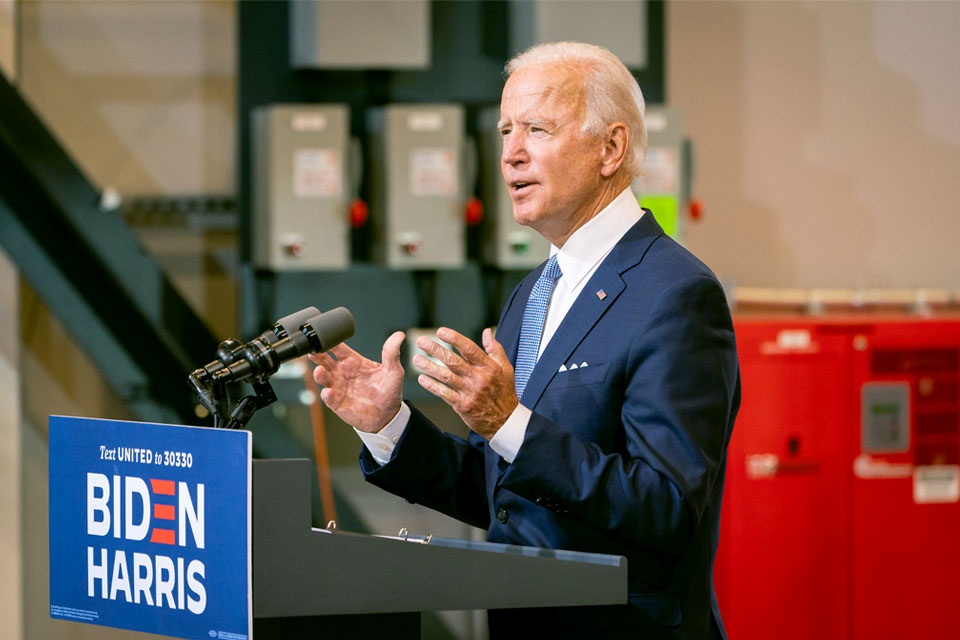Blog Published September 16, 2020 · 16 minute read
Biden’s Climate Plan Embraces Solutions Clean Energy Businesses Need
Ellen Hughes-Cromwick, John Milko, & Andres Prieto

The recession brought on by COVID-19 has damaged large parts of our economy, including the clean energy sector. Third Way conducted a survey of clean energy businesses to better understand the state of the sector, and what kinds of policy support businesses will need to survive and ultimately grow again.
We received more than 250 responses. First, the bad news: more than 80% of companies said they were moderately to severely impacted by the recession. The good news: the policies that most of these companies said could help put the clean energy industry on the road to recovery are included in former Vice President Biden’s Climate Plan.
Survey Respondents’ Comments Sound A Lot Like the Biden Climate Plan
When the US economy began declining due to the pandemic, clean energy businesses flocked to federal assistance in large numbers. While this assistance stabilized many companies, they now anticipate persistent job cuts and wage reductions to survive given the hit to their customer orders.
On the positive side, these companies see climate and energy policy as a catalyst for future business activity and job creation. We asked an open-ended question on the survey about policies that would help address climate change:
“Should the Federal Government enact major legislation to fight climate change? If so, how might this impact your business?”
This yielded 170 qualitative responses, with 90% endorsing some type of policy action. Unprompted, there was a remarkable syncing up of the clean energy business responses and the provisions laid out in the Biden Plan. That got us back to re-reading the Biden Climate Plan issued on July 14, 2020, to see how well it aligns with clean energy business needs.
Common Ground: Three Big Things
1. Partnering with the Private Sector for Research and Innovation
Research and innovation are hugely beneficial to society at large. Knowledge spillover and new, better technology provide public goods that we all benefit from. Still, the market consistently underinvests in research and technology because firms often lack the necessary resources to fund it. This is particularly true for climate-related innovation, and it’s why government needs to play a substantial role in supporting it.
This came across very clearly in the survey responses from clean energy businesses. Many cited the need for the federal government to foster more research and innovation in order to get private businesses ramping up on clean energy technologies which will address climate change risks. Most of the comments about research and innovation reflect on how the government can support the initiatives these businesses are working on in order to expand clean energy sources. None of them expressed an interest in relying solely on the government for assistance, but rather talked about the need for early stage support in order to expand their capabilities over the long run. Here are some quotes from survey respondents:
“Absolutely! We are experts in mitigating Greenhouse Gas (GHG) emissions and need more funding to discover or finish developing technologies that will eliminate GHG emissions as well as add new clean energy sources for the future.”
“We focus on innovation through collaboration with early stage startups to help them grow into change agents. Direct government investment in these startups (like the Air Force SBIR initiatives) would be the best tool in accelerating change - accelerating clean tech into place.”
The Biden Plan bases its innovation proposals on these building blocks. For example, it proposes funding for research on technologies like carbon capture and storage technology, advanced nuclear, and grid scale storage. We know that markets won’t fund these technologies on their own, and therefore federal government policies are needed in order to prevent the worst impacts of climate change. All of these will be critical for fully decarbonizing the economy and lowering the costs of climate action.
Additionally, the Biden Plan proposes substantial increases to government-funded R&D for our national laboratories and a new federal agency modeled after the successful Advanced Research Projects Agency – Energy program at the Department of Energy. The new research arm, called ARPA-C, will seek to accelerate technology advances to deliver a 100% clean energy target.
2. Accelerating Investment Using Standards and Infrastructure Spending
Third Way’s survey showed strong support from clean energy businesses for many of these same investment initiatives highlighted in the Biden Climate Plan. They cited many different types of standards which would allow companies to plan for stronger growth in demand for clean energy products and services. One of the recurrent themes in the survey commentary is the need for infrastructure spending to set the stage for a great capacity to accelerate the transition to clean energy. For example, here are just a few of the comments regarding these initiatives:
“Yes, spur investment in renewable energy and carbon sequestration strategies.”
“Absolutely. Things that would help grow our underlying market: EV mandates / incentives, carbon price. Indirect but necessary support: Require EV manufacturers to share data with customers & utilities in real time.”
“Yes, more (electric vehicle) charging infrastructure is needed on interstate highways. It would have a positive effect on our business.”
“Encourage utilities to invest in demand flexibility (even if they lose profits through a lower rate of return on conservation - or just fix the rate of return to benefit conservation).”
The Biden Plan lays out the linkages between clean energy standards, infrastructure investment, and good paying jobs. It includes an aggressive approach to supporting those facing disproportionate climate-related risks, including communities of color and disadvantaged communities without access to health care.
For example, the Plan includes a 15-year clean electricity standard, targeting 2035 as the date by which the US will enjoy a zero-emissions power sector. In order to accomplish this, substantial investment in renewables and other clean energy will be needed in the power sector. Vehicle emissions standards and the increasing demand for electric vehicles1# will require auto manufacturers to increase their investment in low and zero emission vehicles.
It also calls for accelerated investments in clean infrastructure like public transit projects, expansion and improvement of the grid, upgrading 4 million commercial buildings to meet higher energy efficiency standards, and a reinstatement of the solar investment tax credit. These are just some of the highlights of this well-crafted and expansive plan.
3. Using Incentives to Boost Clean Energy Business Activity and Create Jobs
Without any prompting, our survey respondents told us that incentives like the ones in the Biden Plan would help them get back on their feet and driving the U.S. economy forward again.
“Absolutely. Provide incentives and rebates on energy efficiency and LED lighting retrofits.”
“All climate change legislation matters to us as a company created to fight climate change. We're an EV company, and EV tax credits and blanket acceptance of direct sales are significant drivers of EV adoption.”
“Yes, if the government were to subsidize the manufacturing of green technologies such as wind power in the US, that would allow us to be more competitive as a US manufacturer.”
The Biden Climate Plan has several provisions to help generate demand for clean energy products, echoing the business survey responses we received. The Plan includes incentives for consumers to purchase things like electric vehicles, as well as a program that uses the federal government’s purchasing power to kickstart demand—directing $400 billion in federal procurement through 2025 toward clean energy inputs and other American-made products and services. Biden’s Plan also calls for reforming and extending tax credits that many clean energy businesses rely on.
Conclusion
Clean energy was one of the fastest-growing industries in the United States prior to the recession, and it still has strong long-term prospects. We know it; investors know it. It’s not a matter of if, but rather, how quickly we can get this economic engine humming again.
COVID-19 has dealt the industry a considerable setback. But these struggling businesses know they’ll be able to keep their doors open and thrive once again if the right policies are put in place soon. They may not have mentioned the Biden Plan by name, but the overwhelming majority of businesses we surveyed said those were the kinds of policies they need to succeed.
Appendix
Third Way’s Clean Energy Business Survey
We had over 170 comments submitted to an open-ended question on the survey which was conducted in July 2020. Below you will find a summary of the type of comments we received to the following question:
“Should the Federal Government enact major legislation to fight climate change? If so, how might this impact your business?”
Here are the comments:
A permanent ITC for Wind would put the industry on par with US Solar subsidies.
Absolutely! We are experts in mitigating Greenhouse Gas (GHG) emissions and need more funding to discover or finish developing technologies that will eliminate GHG emissions as well as add new clean energy sources for the future.
Absolutely. Provide incentives and rebates on energy efficiency and LED lighting retrofi
Absolutely. Things that would help grow our underlying market: EV mandates / incentives, carbon price. Indirect but necessary support: Require EV manufacturers to share data with customers & utilities in real time. Encourage utilities to invest in demand flexibility (even if they lose profits through a lower rate of return on conservation - or just fix the rate of return to benefit conservation). These would help our underlying market grow and help us close contracts much sooner.
Absolutely. We see how vulnerable our economy is to disruption tiny in scale to climate change. ALL government sponsored programs and stimuli should have some positive impact on achieving sustainability goals.
Absolutely. An infrastructure bill would benefit us on multiple levels by increasing market demand for our cleantech products.
Absolutely. Not concerned with an impact on my company, but the world as a whole. We have a moral and social obligation to act.
Absolutely; this is first order of business at this moment. This will positively impact our business, we are able to reduce large amount of the CO2 gases three times less expensive way even when comparing with green energy.
Additional solar projects would get funded.
All climate change legislation matters to us as a company created to fight climate change. We're an EV company, and EV tax credits and blanket acceptance of direct sales are significant drivers of EV adoption.
Incentives for large scale adoption of renewables would allow us to become cost competitive, similar to the early phases of wind and solar power.
Carbon tax
Congress should allow Electric Companies to provide competitive rebates.
Could impact business both positively and negatively, but we think legislation to fight climate change is the right answer for our country and the world.
Enable more opportunities for sales and opportunity to hire more employees.
Expanded opportunities in Renewable Natural Gas.
Government needs to require green power minimum % that increases over time. Without new power purchase agreements our clients cannot borrow funds to develop geothermal resources and almost all of the investment is upfront.
Heightened emphasis on source control of harmful emissions would provide additional opportunities for systems.
Impact unknown- but we should do it.
It could encourage via incentives property owners to deploy clean fixed-cost safe solar power on rooftops.
It would be a major help.
It would help if: [1] legislation included new infrastructure development [2] provided incentives (e.g., grants) to greentech incubators) [3] established a carbon tax and dividend to help fund these [4] provide incentives to consumers and commercial building owners to retrofit with energy efficiency technologies and solar [5] allowed consumers to depreciate purchases of electric vehicles - same as businesses.
It would increase our production of wind foundation post tension steel.
It would increase pressure to develop more renewables, which would help us.
They need to re-brand the fighting of climate change and make it sound more like "smart and efficient energy production". There are huge cost-saving benefits of alternative energy (solar) that are overlooked because the 'climate change' movement is politically distracting.
We focus on innovation through collaboration with early stage startups to help them grow into change agents. Direct government investment in these startups (like the Air Force SBIR initiatives) would be the best tool in accelerating change - accelerating clean tech into place.
We make small renewable energy systems for distributed electricity production. Major legislation to support distributed energy systems would really stimulate lots of startup companies because there are so many practical ways to make distributed energy at small scale. More distribution = more jobs and innovation.
Yes - a carbon fee and dividend would greatly incentivize a reduction in ghg emissions and move us quickly to a cleaner economy and more healthy environment.
Yes - focus on energy transition to renewable power and electrification of transportation and heating.
Yes please. Clean Energy businesses cannot compete when the fossil fuel businesses use atmosphere as a free dump. Mandatory emission caps should introduced and a gradually increasing price should be applied to CO2 emissions, in fact all greenhouse gas emissions. Solar permitting process should be simplified.
Yes, this should be a priority of the federal govt and is way past due. This would help increase demand for the types of energy storage projects we develop, which are in part driven by a need to enable more intermittent renewables penetration.
Yes!! We must establish a clean energy manufacturing base.
Yes!! Would jump start opportunities to increase my business.
Yes, climate change is an existential threat (to) societies everywhere. Our company plays an important role in producing more wind energy at lower cost. We have to convert to an electric energy economy as fast as possible to limit the damage already baked into the atmosphere. Various renewable resources are needed to make that happen. This can limit enormous pending economic devastation while stimulating economic growth and opportunities in new sectors. It's happening anyway, but not fast enough.
Yes, absolutely! This will expand market opportunities.
Yes, Absolutely! Doing so would increase revenue and drive economies of scale (reducing cost) for renewable energy generation solutions.
Yes, absolutely. We believe that it will create good jobs and energy independence, leading to a more prosperous economy and more consumer spending, which benefits us directly.
Yes, but must be done in a consultative way which engages private sector stakeholders.
Yes, if the government were to subsidize the manufacturing of green technologies such as wind power in the US, that would allow us to be more competitive as a US manufacturer.
Yes, it will drive more efficient use of energy, requiring the sophisticated systems and solutions we developed.
Yes, more charging infrastructure is needed on interstate highways. It would have a positive effect on our business.
Yes, more regulation is needed to address/fight climate change so that technologies like ours can be seen as a requirement and not a "nice-to-have."
Yes, spur investment in renewable energy and carbon sequestration strategies.
Yes, the government should reduce oil and gas subsidies and subsidize electric vehicle infrastructure.
Yes, the major legislation to fight climate Crisis, will allow our focus (non-profit, hands-on Solar education) to get back into the swing!
Yes, this would help our business by sending a clear signal.
Yes, this would likely spur more interest in solar power and allow us to hire and train more workers.
Yes, we deal with traffic congestion problems. If cities had the infrastructure funds and the requirement to improve over time our business and the air we breathe would improve dramatically.
Yes, we need to do everything we can to slow global warming. Regulations give teeth to the green building certification industry.
Yes, we would hire more and increase our capital expenditures. Resulting in additional US based manufacturing.
Yes. Federal legislation to combat climate change would lead utilities to more renewables, which would facilitate the development of solar, wind, and energy storage projects.
Yes. Increase renewable penetration.
Yes. Our business is pre-revenue and would be accelerated by legislation promoting green building codes and on-site generation for commercial buildings.
Yes. The carbon tax would create a market force that would drive private investment into various clean technologies. The market would choose the winners. "Clean Peak" incentives, such as a declining production credit for solar power dispatched at night, would also beget the necessary private investment, and let the market choose the winners.
Yes. This would boost our business and accelerate the transition to a clean energy economy.
Yes. We provide solutions that fight climate change. Steady policy is the foundation of any stable business.
Yes. Would significantly increase my business, and our re-hiring, and hopefully expansion of hiring to surpass pre-COVID 19 levels.
Yes. A major government effort would open up clean energy investment opportunities for our clients.
Yes. A requirement to make buildings (which taken together represent 40% of energy consumption and GHG emissions) carbon neutral or net zero energy would drive adoption of our technology - transparent PV windows for commercial buildings and glass facades. There is a global trend toward net zero buildings and a federal policy would accelerate what is currently a patchwork of policies.
Yes. As an incubator, more federal dollars and attention directed towards fighting climate change increases the number of startups we are able to support, as well as the number of entrepreneurs deciding to create a startup.
Yes. Good climate policy would be good for renewable energy.
Yes. I don't know how it will impact our business, but it needs to happen and we'll figure out how to adjust as needed.
Yes. It will improve our business opportunities immensely.
Yes. It would be a huge boost if done correctly with stakeholder input not a select group, but from a large sample.
Yes. It would not only save the damn world, it would help our business make more money.
Yes. It'll help accelerate renewable energy adoption, energy efficiency, and the clean energy industry. We do solar workforce training and run public education campaigns on clean energy, and support solar group buys so as these markets accelerate and develop, need for our services will grows.
Yes. Need to incentivize renewable energy installation. Also need to build more transmission line infrastructure.
Yes. Not much impact on us as we are a home retrofit contractor. Incentives for properly air sealing, insulating, and heating homes would benefit us as well as homeowners that need reduced utility cost.
Yes. Pricing CO2 will make clean energy more economically competitive.
Yes. Significant growth would result from technologies that incentivize energy storage and electrification.
Yes. Significant in our long term growth.
Yes. Such legislation would positively impact my business.
Yes. Will help business grow and increase employment.
Yes. Would stop subsidizing fossil fuels and sucking capital away from those destructive efforts (economically and environmentally).
Yes...policy should support economic transition to clean energy with funds to aid in the transition. Subsidies for fossil fuels should be redirected to this effort.
Yes; but repealing/expiring subsidies for conventional fuels would help just as well. Climate change regulation would be most helpful to battery storage if it drives more consumption for EV, which has been responsible for driving battery prices way down.
Yes; we cannot keep 'kicking this can down the road'. Carbon sequestering, clean energy tax credits, actual penalties for polluting emitters would all make a difference.
Yes--we need a consistent and aggressive policy framework to support business climate actions.



